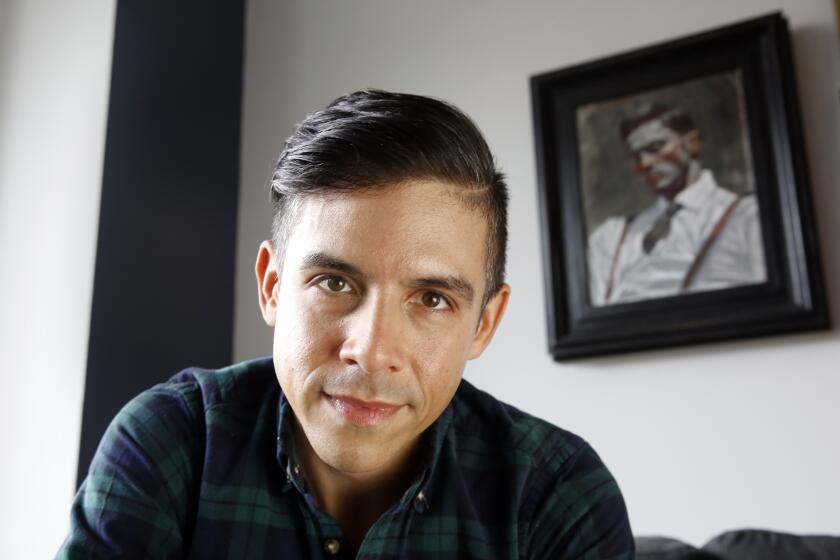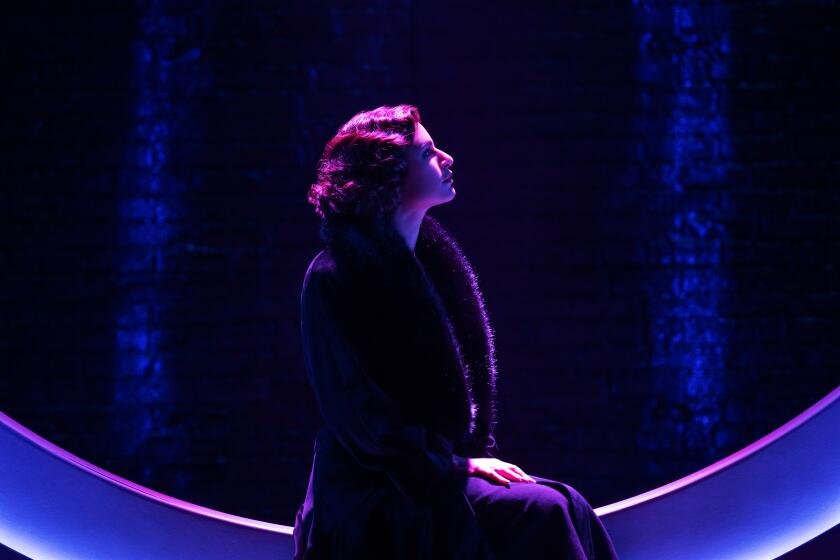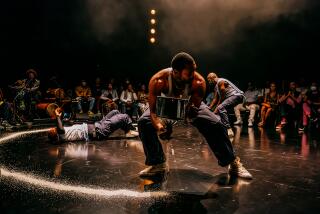Review: Tony-winning ‘The Inheritance’ is better in Los Angeles than on Broadway
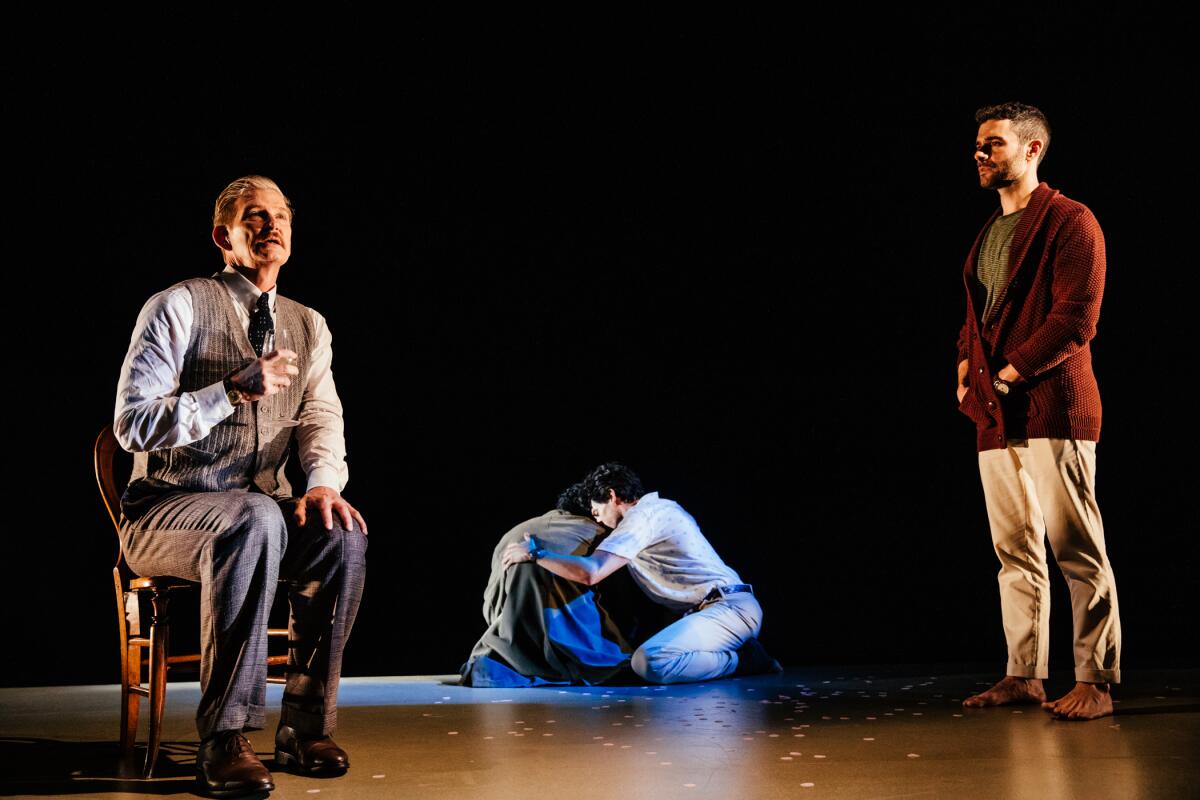
Hats off to the Geffen Playhouse for pulling off with exquisite panache a most difficult double-header in “The Inheritance,” Matthew López’s two-part, Tony-winning gay drama.
This marathon undertaking, roughly 6½ hours long, is broken up into two plays. Forget about fast-food theater: This is a full-course dramatic meal.
An epic that had its world premiere in London in 2018, “The Inheritance” follows a group of gay men — friends, lovers and exes — as they piece together their intergenerational story. While grappling with the private and public upheaval of their lives — the election of Donald Trump may be the most terrifying moment in the play — the characters connect the dots between the gay past and the gay present.
Having experienced the work on Broadway in 2019, I was worried that the Geffen Playhouse had bitten off more than it could handle. But this top-notch production, directed by Mike Donahue (who knows his way around López’s work), has to be counted as one of the pinnacle achievements in the theater’s history.
Casting two of the principals with Latino actors — Juan Castano as Toby Darling (the role that won Andrew Burnap a Tony Award) and Bradley James Tejeda, who plays both Adam and Leo — sheds fresh light on a drama that’s committed to exploring the subject of gay identity from a wide variety of sociopolitical angles.
There was criticism in New York that the play’s vision of gay culture was monolithic. The ensemble was diverse, but the central cast reflected the long-standing prioritization of the white gay male experience.
The playwright responded to this line of attack by explaining that his background as a Latinx writer informs every aspect of “The Inheritance,” from the heightened awareness of economic class to the confrontation with issues of addiction and alcoholism. It was a tricky argument to make given the fraught battles over race and representation.
But the enhanced diversity of the Los Angeles production sharpens our awareness of the way the characters are understood in the context of their marginalization and degrees of privilege. The play hasn’t substantially changed yet its truthfulness seems larger.
Broadway is buzzing over a 6 1/2-hour tale of gay men connecting across generations. Playwright Matthew Lopez talks about trailblazers, starting with E.M. Forster.
This is a human-centered drama, hinging on the fate of a beautiful old house with a rich spiritual legacy. The story is compulsively absorbing — the hours fly by — but the tale isn’t just told. It’s discussed, argued over and sifted for meaning.
Politics is a natural part of this narrative, which we’re told early on will be about friendship, love and loss. Renewal too is a main topic, but much suffering will have to transpire before this pattern makes itself known.
Borrowing the basic plot of E.M. Forster’s “Howards End,” “The Inheritance” sets out to create its own gay fantasia on national themes, to borrow the subtitle of Tony Kushner’s “Angels in America,” another North Star for López. The characters in the “The Inheritance” are consumed with the masterworks of the gay canon, and the drama itself is indebted to this body of literature that has offered gay men a compass for their lives.
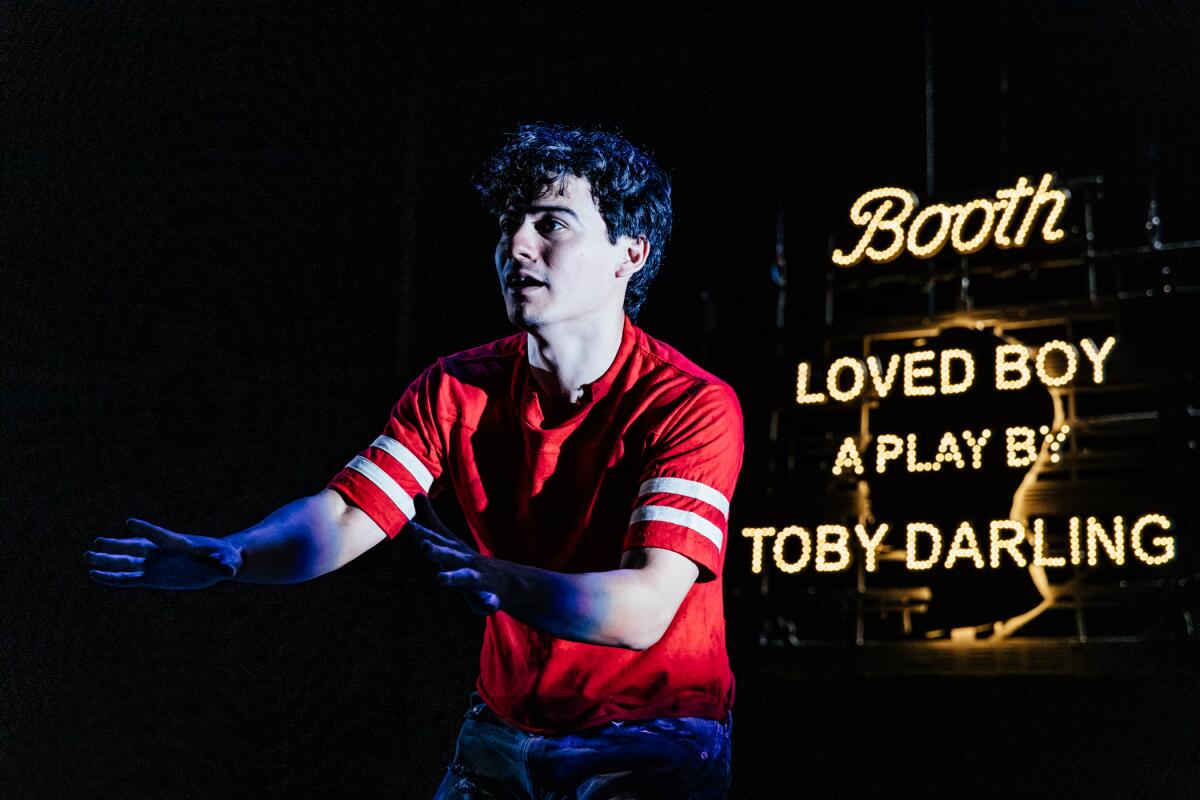
One obvious if unmentioned influence on “The Inheritance” is Terrence McNally, whose play “Love! Valour! Compassion!” provides an emotional framework for exactly this kind of ensemble narrative. Warning: López has written a play that induces all manner of crying, from a moistening of the eyes to all-out sobbing. I’m sure I wasn’t alone at the end of Part 1 in wondering whether I might drown inside my mask.
When the play begins, a young writer, sitting with a group of gay men, is struggling to start his story. Morgan (Bill Brochtrup), better known by his full name, E.M. Forster, magically appears as a mentor and source of inspiration. He engages this would-be scribe in conversation, drawing out what is important in his tale and encouraging him to tell it as only he can.
“One may as well begin with Toby’s voicemails,” the young writer starts, taking inspiration from the captivating casualness of the first line of “Howards End” — “One may as well begin with Helen’s letters to her sister.”
Toby (Castano), a gay novelist whose book “Loved Boy” is about to be turned into a play, is the boyfriend of Eric (Adam Kantor), who holds the lease to his family’s enviably large and infuriatingly cheap apartment on the Upper West Side. Their romantic relationship doesn’t survive the vicissitudes of sex or New York’s rent control regulations, but these temperamentally different characters serve as the equivalent of the Schlegel sisters of “Howards End.”
I wasn’t particularly excited about sitting through this ‘Funny Girl’ revival again. But I left understanding why tickets to see Lea Michele as Fanny Brice are going for a king’s ransom.
Toby, who is still a fugitive of his rough childhood, is romantically volatile and self-destructive. Eric, Ivy League educated and consummately middle class, is self-effacing to an almost punishing degree. They are ensconced in a community of New York gay men who, crouching along the perimeter of the set without shoes or socks, bear witness to the couple’s unfolding story in the manner of an ancient Greek chorus.
For all the literariness of the drama, the plot of “The Inheritance” is as roiling as a soap opera. Toby falls in love with a young New York rich kid named Adam (Tejeda), an actor fresh out of Yale who flirtatiously scores the lead part in Toby’s new play. Eric develops a deepening bond with an old acquaintance named Walter Poole (Brochtrup), the husband of billionaire Henry Wilcox (Tuc Watkins).
The ensuing entanglements are too complicated to recap, but one key plot point involves Walter, who’s gravely ill. He finds in Eric a spiritual heir and tries to leave him the gracious upstate New York home that was used as a haven for abandoned gay men dying of AIDS during the worst days of the epidemic.
This bequest is foiled by Henry’s greedy sons, but Henry grows smitten with Eric, who is dealing not only with the loss of his cherished family apartment but also with the end of his relationship with Toby. Having turned his life upside down for manipulative, career-minded Adam, who’s now starring in his hit Broadway play, Toby attempts to drown his sorrows in Leo, a sex worker he pays him an extra hundred bucks for a kiss and introduces to the decadent drug culture of Fire Island.
The sets by Jaimie Todd follow the original Bob Crowley scenic design, which kept everything minimal in Stephen Daldry’s Tony-winning production. The theatrical narrative is spoken as much as it is acted out. The audience’s imagination is relied upon to conjure the fancy real estate that is really only the backdrop for a story about the ties of gay men, who manage to create new kinds of families to replace the ones that rejected or merely tolerated or failed to fully embrace them.
Walter’s beloved country residence appears onstage as a gleaming dollhouse. López recognizes as much as Forster the way such a genteel home, surrounded by a long exhale of gardens, can be a repository for our deepest longings — for a place of connection and comfort, a shelter from the storms of a hostile world and a sanctuary for emotional, physical and spiritual recovery.
Part 2 no longer seems as bumpily melodramatic as it did in New York. Castano makes Toby’s descent into addiction less showy — the wild theatricality is still in place, but there’s more texture to the character’s wounded psychology. Toby conceals his past, but this portrayal finds a biographical through line. Tejeda, who’s less overtly Machiavellian as Adam, poignantly emphasizes the intelligent watchfulness of victimized Leo.
These acting adjustments are aided by the intimacy of the venue. The Geffen Playhouse allows for a deeper connectedness within both the company and the audience. I can’t remember when I have felt so engulfed by a play.
Whether channeling the spirit of E.M. Forster or inhabiting the frail body of Walter, Brochtrup parts a curtain to reveal a more gentlemanly if constricted era of gay existence. The humanity of his performance gives the production its spiritual glow.
Watkins allows us to see the monstrousness of Henry’s brand of ruthless capitalism without making him out to be a complete monster. Kasey Mahaffy, as sharp-edged progressive Jason, and Jay Donnell, as straight-talking doctor Tristan, are standouts in uniformly strong ensemble.
In the small but potent role of Margaret Avery, the caretaker of the upstate New York house, Tantoo Cardinal movingly conveys the grief of a mother who has turned her failure to accept her gay son when he needed her most into intuitive service for others. Transformation is always possible, a lesson that Kantor’s Eric, in a beautifully handled anchoring performance, comes not just to understand but to embody.
Under the gently guiding hand of Donahue, “The Inheritance” realizes its full potential at the Geffen Playhouse. You should see it because it’s excellent theater that earns its long duration. But I recommend the production even more strongly for the way its Forster-inspired narrative may unlock something healing within you.
‘The Inheritance, Part 1 and Part 2’
Where: Gil Cates Theater at Geffen Playhouse, 10886 Le Conte Ave., Westwood
When: 7:30 pm. Tuesdays-Fridays, 1 and 7 p.m. Saturdays and Sundays. End Nov. 27.
Tickets: Currently $39-$129
Contact: (310) 208-2028 or geffenplayhouse.org
Running time: Part 1: 3 hours, 10 minutes, including two intermissions
Part 2: 3 hours, 15 minutes, including one intermission and a brief pause
More to Read
The biggest entertainment stories
Get our big stories about Hollywood, film, television, music, arts, culture and more right in your inbox as soon as they publish.
You may occasionally receive promotional content from the Los Angeles Times.
